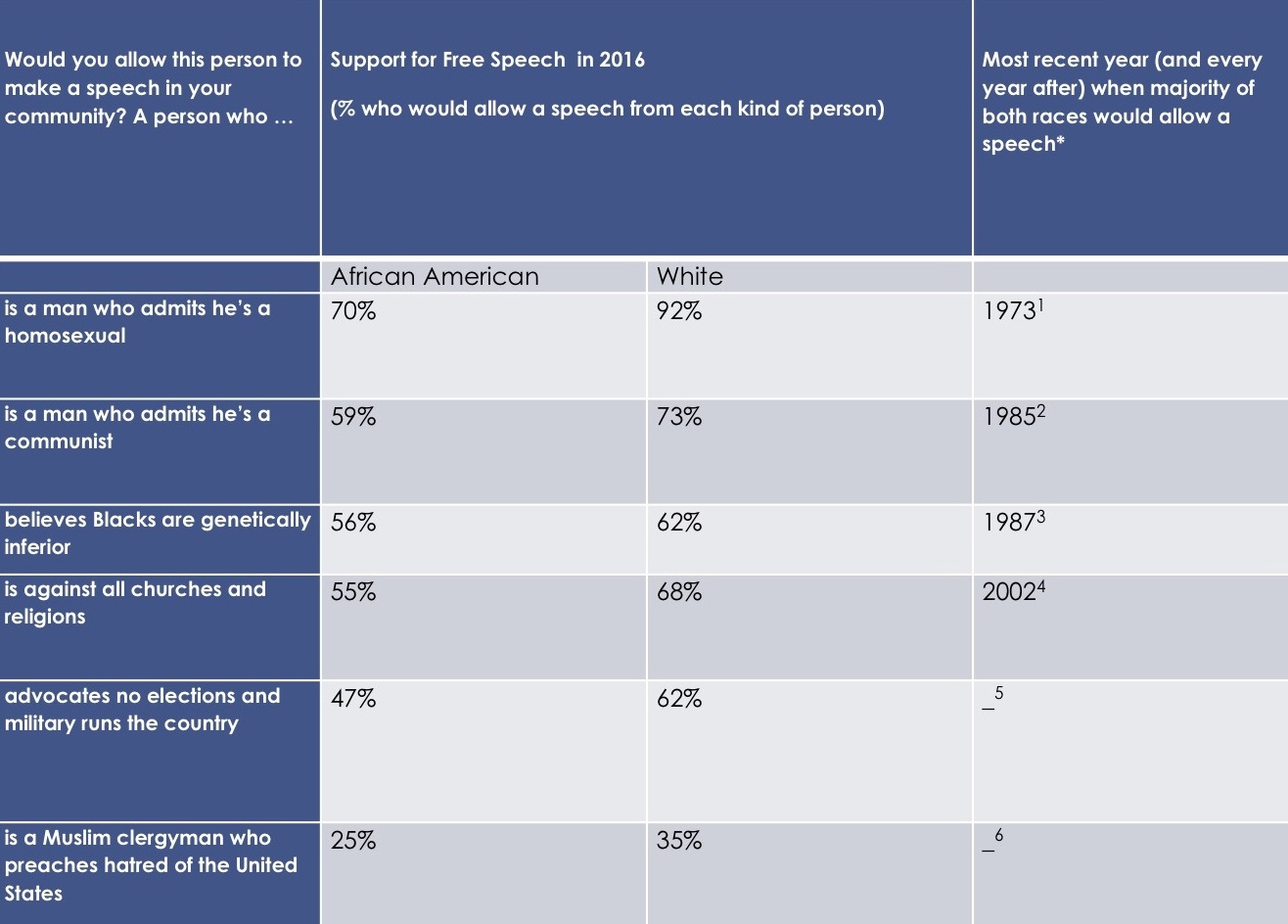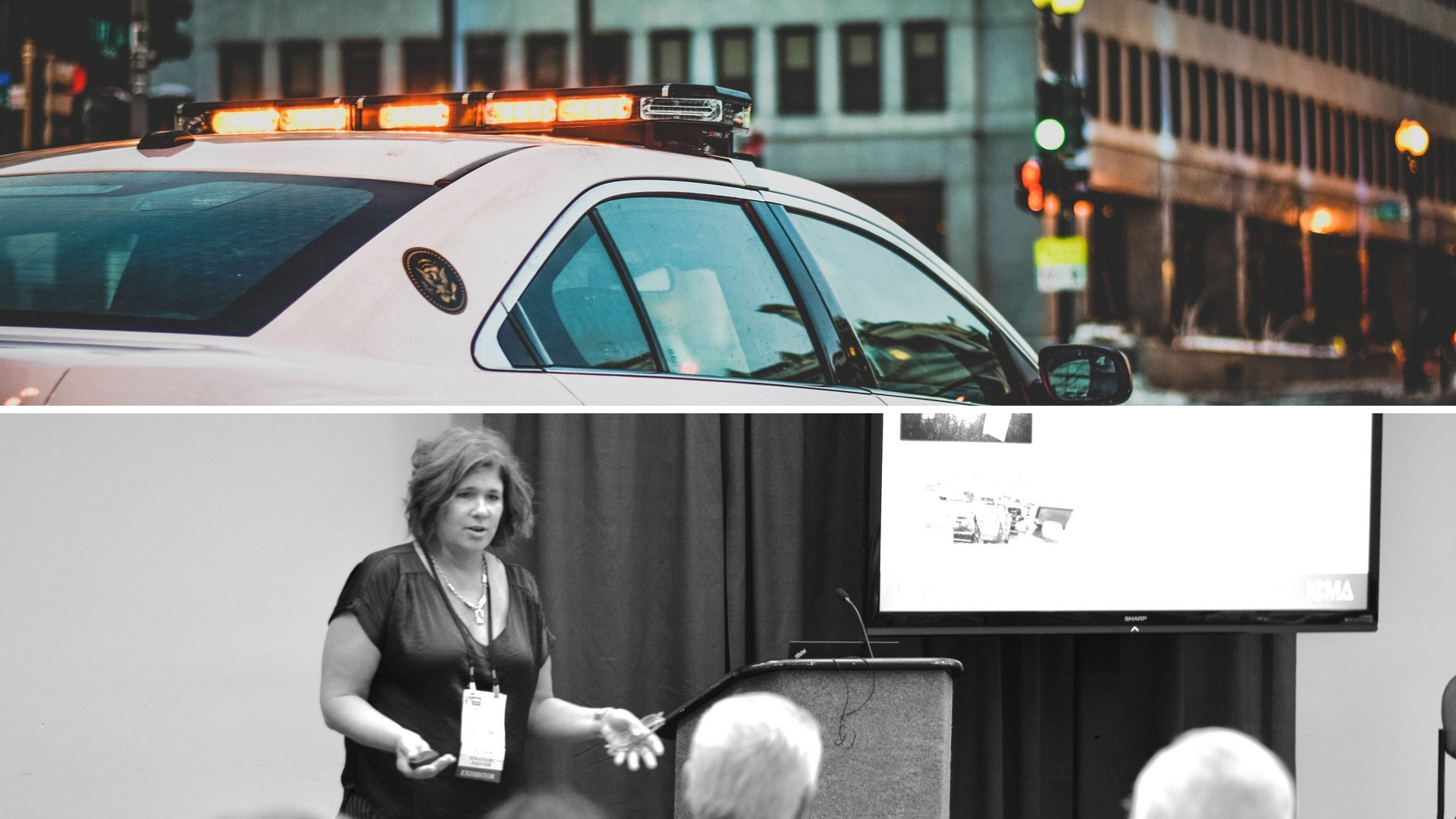Examining U.S. Historical Support for Free Speech in the Aftermath of Charlottesville
By NRC on August 21, 2017

– By Thomas Miller–
The right to express an opinion, however unpopular, is protected by the First Amendment. But it won’t take long in living room conversation to find the gray line where certain kinds of hateful speech challenge the tolerance of even an American who staunchly supports the First Amendment. Free speech does not protect making threats to others, but the courts have had to weigh in on what constitutes a real threat that would justifiably prohibit expression of a point of view.
When free speech goes so wrong, as it did in Charlottesville, the occasion usefully can motivate us to examine what Americans and others across the globe think about the liberties U.S. society protects. A majority of Americans long has voiced its support for expression of views ranging from unpopular to vile as shown in the General Social Survey, a long time examination of adult attitudes conducted by the National Opinion Research Center (NORC).
Historical Support of Free Speech for Unpopular Perspectives
For forty or more years, a representative sample of U.S. adults have been asked by NORC about their willingness to allow a speech given by someone who is a homosexual, a communist, an anti-religionist, a military supremacist or an avowed racist. Although attitudes about communist and racist free speech have held pretty steady over the decades, permissiveness about the speech of homosexuals, anti-religionists and military supremacists has risen. These trends are largely true of both African Americans and Whites who have come to accept the right to free speech from most of these groups. The trends are generally true of both Democrats and Republicans, as well.
In every case, a larger percent of Whites than African Americans have been willing to support speeches by any of these hypothetical orators. However, in four of the six cases, a majority of both races have come to tolerate all these sources of free speech.
The longest and most pervasive support for free speech is bestowed on homosexuals (approved by a majority of Whites and Blacks since 1973) and communists (approved by a majority of Whites and Blacks since 1985). Starting in 1987, a majority of both White and Black respondents felt they would approve allowing an anti-Black bigot to speak. But it wasn’t until 2002 that a majority of both races accepted the free speech of someone who was against all religions and churches. For the record, such support of the First Amendment rights of someone who wants to do away with elections and run the country by military dictatorship still awaits a majority of African Americans’ approval, and only a small minority of both races still would tolerate the speech of a Muslim cleric who preaches hatred of the U.S.
Trends in Support for Free Speech Among African Americans and Whites

*Source: https://gssdataexplorer.norc.org/trends.
Questions asked periodically since 1-1973; 2-1972; 3-1976; 4-1972; 5-1976; 6-2008
U.S. Attitudes Toward Free Speech Much More Tolerant than the Rest of the World
When Pew Research Center examined attitudes about free speech in the U.S. and 38 other countries, it discovered that residents of the U.S. were meaningfully more permissive than were residents of the other countries, on average. More U.S. residents than the average of all the other countries (15% to over 40% more) would permit a person to speak critically about the country, say things offensive to religious beliefs, offend minority groups, speak with sexually explicit language or even call for violent protests.
Huge Changes in Beliefs About Country but Not About First Amendment Rights
Despite the stability of support for First Amendment rights in the U.S. - and greater support for free speech in the U.S. compared to other countries - public opinion here is vastly more volatile when the question comes to the state of the union. Satisfaction with how things are going in the country whipsaw with each election of a president from a different party than that of the prior president.
A graph from Pew shows that when a Democrat is president, Democrats rate their satisfaction with the way things are going in the country far more positively compared to Republicans. But just as soon as a Republican comes to office, it switches and the Republicans think the country is doing better than do Democrats. The switch happens almost instantaneous with the election and lasts throughout the President’s term(s).
Although American culture steadfastly supports our First Amendment right to free speech – irrespective of party or race – our outlook about the direction of the country is deeply influenced by who is chosen to be President. The divide we have seen in the early days of the Trump administration has occurred before – during the middle years of the George W. Bush presidency, for example.
Not only may what we have seen in Charlottesville do nothing to deter our support in principle for the right to free speech, studies show this incident also is unlikely to undermine the views of how the country is running as seen differently by Democrats and Republicans.
Although the melee in Charlottesville may have started with the question of free speech, the violence that ensued raises other important questions about American culture and values. Understanding not only the historical principles that led to the founders’ construction of the first amendment to the Constitution but also the perspectives of most contemporary Americans who support that amendment may help fashion the right responses to the violence in Charlottesville.
Related Articles
- Public Engagement in the Digital Age: Local Governments Surmounting Internet Negativity
- How the 2017 ICMA Summits Empower Inclusivity in Local Government
- Reflecting on Events at Denver’s 2016 Martin Luther King Day Marade
National Research Center, Inc. ( NRC ) is a leading research and evaluation firm focusing on the information requirements of the public sector, including non-profit agencies, health care providers, foundations and local governments. Visit our home on the Web at www.n-r-c.com. Check out our blog for more news, tips and human-interest stories from NRC.
Popular posts
Sign-up for Updates
You May Also Like
These Related Stories

Four Crucial Priorities Public Safety Leaders Should Consider

Damema Details: Top Five Survey Research Jargon Terms [Video]


